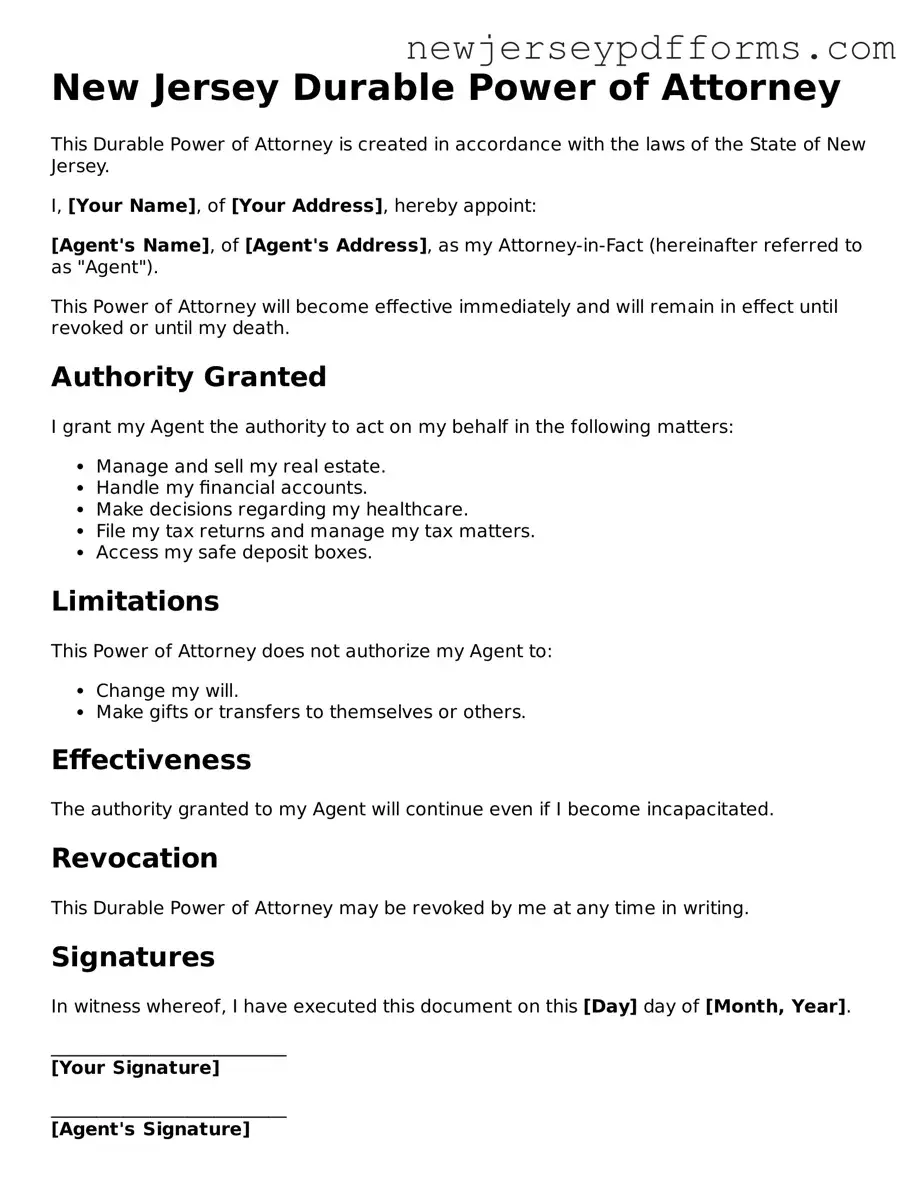What is a Durable Power of Attorney in New Jersey?
A Durable Power of Attorney (DPOA) in New Jersey is a legal document that allows an individual, known as the principal, to appoint someone else, referred to as the agent or attorney-in-fact, to make decisions on their behalf. This authority remains effective even if the principal becomes incapacitated, ensuring that their affairs can be managed without interruption.
Why should I create a Durable Power of Attorney?
Creating a DPOA provides peace of mind. It allows you to choose a trusted person to handle your financial and legal matters if you cannot do so yourself. This can be especially important in situations involving serious illness, injury, or cognitive decline. It also helps avoid potential disputes among family members regarding who should manage your affairs.
How do I create a Durable Power of Attorney in New Jersey?
To create a DPOA in New Jersey, you must complete a specific form that complies with state laws. You should clearly outline the powers granted to your agent. It is advisable to have the document notarized to ensure its validity. Consulting with an attorney can also help ensure that your DPOA meets your needs and adheres to legal requirements.
Can I revoke a Durable Power of Attorney?
Yes, you can revoke a Durable Power of Attorney at any time as long as you are mentally competent. To do so, you must create a written revocation notice and provide it to your agent and any institutions that may have a copy of the original DPOA. It is wise to keep a record of the revocation for your own reference.
What powers can I grant to my agent?
You can grant a wide range of powers to your agent, including the ability to manage financial accounts, make investment decisions, pay bills, and handle real estate transactions. However, you can also limit the powers as you see fit. Clearly specifying what your agent can and cannot do is crucial for avoiding misunderstandings.
Is a Durable Power of Attorney the same as a Healthcare Proxy?
No, a Durable Power of Attorney and a Healthcare Proxy serve different purposes. A DPOA typically focuses on financial and legal matters, while a Healthcare Proxy specifically grants authority to make medical decisions on your behalf if you are unable to do so. It is advisable to create both documents to ensure comprehensive coverage of your needs.
Do I need a lawyer to create a Durable Power of Attorney?
While it is not legally required to have a lawyer to create a DPOA in New Jersey, seeking legal advice can be beneficial. An attorney can help you understand your options, ensure that the document complies with state laws, and clarify any complex provisions that may be included.
What happens if I do not have a Durable Power of Attorney?
If you do not have a DPOA and become incapacitated, your family may need to go through a court process to obtain guardianship or conservatorship. This can be time-consuming, costly, and may lead to disputes among family members. Having a DPOA in place can prevent these complications and ensure your wishes are respected.
Can I use a Durable Power of Attorney created in another state in New Jersey?
In general, New Jersey will recognize a Durable Power of Attorney created in another state as long as it complies with the laws of that state and meets New Jersey’s requirements. However, it is advisable to consult with a legal professional to ensure that the document is valid and effective in New Jersey.

